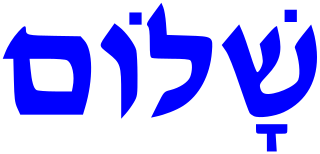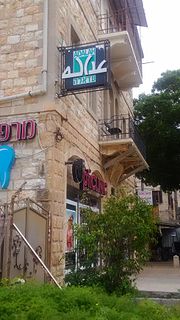
Palestinians or Palestinian people, also referred to as Palestinian Arabs, are an ethnonational group descending from peoples who have inhabited the region of Palestine over the millennia, and who are today culturally and linguistically Arab.

Neve Shalom, also known as Wāħat as-Salām is a cooperative village in Israel, jointly founded by Israeli Jews and Arabs in an attempt to show that the two peoples can live side by side peacefully, as well as to conduct educational work for peace, equality and understanding between the two peoples. The village is located on one of the two Latrun hilltops overlooking the Ayalon Valley, and lies midway between Tel Aviv and Jerusalem. Falling under the jurisdiction of Mateh Yehuda Regional Council, in 2019 it had a population of 323.

Arabic music or Arab music is the music of the Arab world with all its diverse music styles and genres. Arabic countries have many rich and varied styles of music and also many linguistic dialects, with each country and region having their own traditional music.

Shalom is a Hebrew word meaning peace, harmony, wholeness, completeness, prosperity, welfare and tranquility and can be used idiomatically to mean both hello and goodbye.
The music of Israel is a combination of Jewish and non-Jewish music traditions that have come together over the course of a century to create a distinctive musical culture. For almost 150 years, musicians have sought original stylistic elements that would define the emerging national spirit. In addition to creating an Israeli style and sound, Israel's musicians have made significant contributions to classical, jazz, pop rock and other international music genres. Since the 1970s, there has been a flowering of musical diversity, with Israeli rock, folk and jazz musicians creating and performing extensively, both locally and abroad. Many of the world's top classical musicians are Israelis or Israeli expatriates. The works of Israeli classical composers have been performed by leading orchestras worldwide.

The music of Palestine is one of many regional subgenres of Arabic music. While it shares much in common with Arabic music, both structurally and instrumentally, there are musical forms and subject matter that are distinctively Palestinian.

The Arab citizens of Israel are the largest ethnic minority in the country. They comprise a hybrid community of Israeli citizens with a heritage of Palestinian citizenship, mixed religions, bilingual in Arabic and Hebrew, and with varying social identities. Self-identification as Palestinian citizens of Israel has sharpened in recent years, alongside distinct identities including Negev Bedouin, the Druze people, and Arab Christians and Arab Muslims who do not identify as Palestinians. In Arabic, commonly used terms to refer to Israel's Arab population include 48-Arab and 48-Palestinian. Since the Nakba, the Palestinians that have remained within Israel's 1948 borders have been colloquially known as "48-Arabs". In Israel itself, Arab citizens are commonly referred to as Israeli-Arabs or simply as Arabs; international media often uses the term Arab-Israeli to distinguish Arab citizens of Israel from the Palestinian Arabs residing in the Palestinian territories.
Arab Jews is a term for Jews living in or originating from the Arab world. The term is politically contested, often by Zionists or by Jews with roots in the Arab world who prefer to be identified as Mizrahi Jews. Many left or were expelled from Arab countries in the decades following the founding of Israel in 1948, and took up residence in Israel, Western Europe, the United States and Latin America.

Father Bruno Hussar was the founder of Neve Shalom / Wahat al-Salam, an Arab/Jewish village in the no man's land between Israel and Palestinian territories, dedicated to coexistence. Father Bruno derived the name from the book of Isaiah (32:18): "My people shall dwell in an Oasis of Peace". Born in Cairo, he converted to Roman Catholicism while studying engineering in France. He was a genuinely 'transnational transcultural and multilingual' individual.
The various nations of the region include the Arabic-speaking countries of the Middle East, the Iranian traditions of Persia, the Jewish music of Israel and the diaspora, Armenian music, Kurdish music, Azeri Music, the varied traditions of Cypriot music, the music of Turkey, traditional Assyrian music, Coptic ritual music in Egypt as well as other genres of Egyptian music in general, and the Andalusian music very much alive in the greater Middle East, all maintain their own traditions. It is widely regarded that some Middle-Eastern musical styles have influenced Central Asia, as well as Spain, and the Balkans.

Simon Shaheen is a Palestinian-American oud and violin player and composer who holds Israeli citizenship.
Mizrahi music refers to a music genre in Israel that combines elements from Europe, the Middle East and North Africa; and is mostly performed by Israelis of Mizrahi Jewish descent. It is usually sung in Modern Hebrew, or literary Hebrew.

Saleh (1908–1986) and Daud (1910–1976) Al-Kuwaity were Kuwait-born Israeli musicians of Iraqi-Iranian ancestry who rose to prominence in the Arab world in the early twentieth century. The brothers had a pioneering role in the modern classical music of Iraq and Kuwait, especially the Iraqi maqam and Kuwaiti sawt genres. In 1951, the brothers immigrated from Iraq to Israel.

Shlomo Gronich is an Israeli composer, singer, songwriter, arranger, and choir conductor.

Adalah – The Legal Center for Arab Minority Rights in Israel is a human rights organization and legal center.

Mark Smulian is an English musician, best known as a music producer and bass player.

Bustan Abraham was an Israeli band playing mostly instrumental music, which existed between 1991 and 2003. Its name means "Abraham’s garden"; the reference to the common ancestor of both Jewish and Islamic traditions intending to imply a unifying theme. The band was called a pioneer in the realm of world music.

Ayman Odeh is an Israeli Arab lawyer and politician. He is a member of Knesset and leader of the Hadash party and Joint List alliance.

Kamilya Jubran is a Palestinian singer, songwriter, and musician.
Sabreen ; is a pioneer Palestinian Arabic musical group. Based in Jerusalem, Sabreen was founded in 1980 by Said Murad. Their vision focused on the development of the Palestinian modern song, reflecting the humanitarian and cultural reality in general, and the suffering endured from the political situation in particular. Sabreen's members have changed over the years, the most notable members were Said Murad, Kamilya Jubran, Odeh Tourjman, Issa Freij, Yacoub Abu Arafeh, Issam Murad, Samer Mussallem, and Wissam Murad. Said Murad is the composer and arranger of the music, and Kamilya Jubran was the lead vocalist on four albums out of the five studio albums released.














